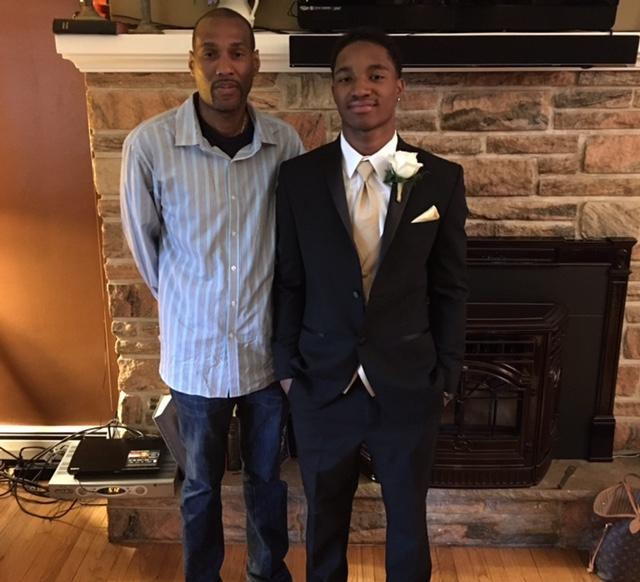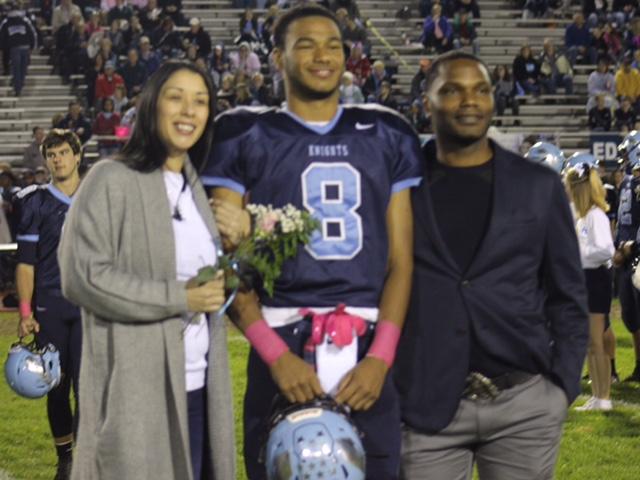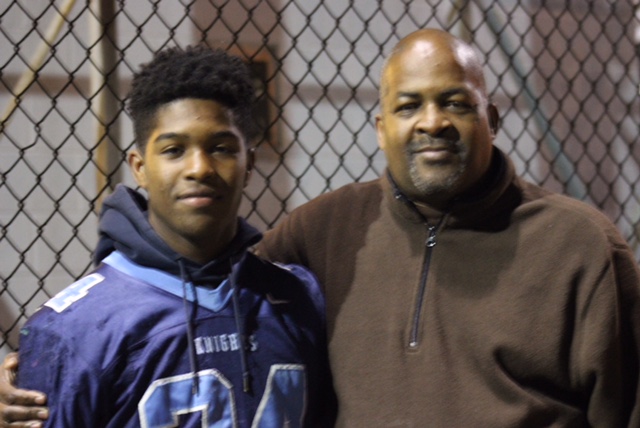Like father, like son: Examining the importance of fatherhood in the black community
North Penn High School student Julian White his father Byron outside of Crawford Stadium during the 2016 season at North Penn.
The black community in United States has overcome many challenges since the Civil Rights Movement. Beyond some of the more obvious hurdles overcome, blacks still have to face many stereotypes that come along with being part of the black community, and some difficult realities as well. The family structure in the black community is continually stereotyped and under scrutiny, particularly with respect to the lack of strong father figures in family structure.. With that stereotype and the statistics that somewhat support it, though, it is important to examine the impact that involved black fathers do have in their children’s lives.
Fatherhood At It’s Finest
It is impossible to ignore that statistics do help support the stereotype, that most black fathers are absent in their children’s lives because according to the 2012 U.S Census,“57.6% of black children, 31.2% of Hispanic children, and 20.7 % of white children are living absent their biological fathers.” With these numbers on the table, The Knight Crier reached out to some black male student at NPHS to get their perspective on family structure. Justis Henley, a Junior and starter of the football team, is appalled by this large contrast in statistics. He understands the unfortunate truth behind the numbers and can see how fortunate he is to have an involved father in his life.
“It is more likely for a white person to have a father in their life, but for the small number of black people that do have dads in their life, their dads are a huge factor in their life and mean a lot to them,” said Henley.
Henley is a part of that smaller number of black people and his father plays an impactful role in his life. Henley’s father, having been to every game that Henley can remember, has yet to disappoint his children with support. His dad not only supports him, but also is just as involved in his daughter’s life. Henley appreciates his father taking time out of a full time job, to come watch him play every Friday without being asked.
“When I see my father in the stands it makes me feel like I have people in my life that care about me,” added Henley.
Henley appreciates his father coming to the games because he knows it wouldn’t be the same without him. If he only had his mom coming to the games he feels that he would get jealous of other players with both of their parents there supporting them. Although he knows his mother would make up for the absence of a father, he still would miss the athletic bonding in his life with his father.
To fathers like Henley’s dad, Keith Henley, he understands the importance of being an involved father and has succeeded in being present in his child’s entire life so far.
“An involved father is fully invested in his child’s life. It’s great to attend your child’s football and basketball games, but being involved goes way beyond that. A good father is active in his child’s schooling, social life and emotional well-being. He asks questions, spends quality time with his child, and most of all, listens. He’s also firm and fair when it comes to discipline and decision-making. The stereotype of black fathers not being involved enough is just that- a stereotype. I believe that negligent fatherhood and race have little to no correlation; negligent fatherhood and a lack of education are certainly more related. My son’s world is filled with outstanding black fathers who dismantle this stereotype,” said Keith Henley.

Justis Henley and his father Keith pose for a picture before the ninth grade formal.
Julian White, a sophomore and starter of the football team, has a dad who is another living example of a black father being involved in his children’s lives. Therefore, White appreciates all that his father does for him because he knows some other kids especially in the black community are not as lucky to have a father in their life.
Similar to Henley’s family, White has a younger brother involved in the drumline, and going to that is just as important as football games to his father. White’s father, Byron White, also understands how much football means to his son and wouldn’t miss a game for anything.
“When he’s at the games, I know out of all the people in the stands, if I make a mistake, he’s there to coach me; not beating me down, but there to tell me what I did wrong and how I can improve,” Julian said.
Julian is grateful for his father being there because of the large impact his father has on his life. He realizes that his father takes time out of his job to be present at everything, without even needing a reminder to come.
“I think my dad feels like I may have a chance to succeed at whatever I’m doing in the future. Whatever it is I’m doing, if I can have a future in it, my dad comes on his own to be there for support,” White added.
Refusing to Fail At Fatherhood
While Henley and White realize how fortunate they are to have had strong fathers, they also believe even if a kid does not have a father, a father figure can be found in teachers, coaches or any other male adults.
Ricky Johns, a senior at North Penn and starter on the football team, is an example of all three scenarios. From time to time Johns has had his father in his life, other times he has had Keith Henley in his life as a father figure, and other times he has lacked a father figure altogether. Through all of this, Johns has never lost focus.
“I kind of just worked through it all and didn’t let his absence bother me. I stayed strong through everything,” said Johns.
For 3 long years Johns had to commentate the highlights of the football games to his father over the phone. During his freshman year his father was imprisoned. Having to play through freshman, sophomore, and junior year not seeing his dad up in the stands hurt a lot, and still brings up emotions when looking back on it. Johns tried not to let losing the connection with his dad get to him though.
“It was different for just living with my mom, sisters and grandma at home. While my dad was gone, my mom tried her best to make it to all the games, but with a full time job trying to support the family, that was hard for her,” said Johns.

Never losing his morals or his character, Johns accepts that everyone makes mistakes. Not knowing exactly when his father would be out of prison, it was definitely a blessing to Johns when his father was released for his senior year.
“Being able to look up in the stands and see him warms my heart. Seeing him makes me feel better and maybe play better. All I want to do is make him proud, and that’s all I care about,” Johns added.
Now Johns’ dad, Rick Johns, is attending all the football games, and is highly involved in his daughters’ lives too. He is making an effort to make up for all the time he lost with his children. Johns having been an outstanding football player in high school himself, inspires his son to be more like him. Johns is just overwhelmed that his father can watch him play what he loves.
“Well life is all about family for me and most of all our faith,” explained Rick Johns. “Support is about being there for the ones who mean everything to you during the good times and most of all the bad.”
Like White and Henley, Johns sees that it is more likely for white children to have their dads in their lives. Being part of the percentage of kids who lived absent of a father for a good amount of time, Johns also feels strongly that the comparison of percentages living without fathers should not be what it is.
Johns would like to see the percentage of black children living without a father decrease, so not as many kids have to go through what he went through. Having lived in a different perspective than both White and Henley, it is not as easy for Johns to be as complacent about his father.
With Rick Johns being involved in his kids’ lives again, Johns and his siblings are now removed from the percent of black children living absent of their father. Although there are different circumstances here, Rick Johns, Keith Henley, and Byron White are all examples of black fathers who have supported their children throughout their lives, knowing the importance of father figures especially for black male youth.



Emanuel Shelton • Feb 27, 2017 at 11:14 am
That is just a fine job at writing that article good job